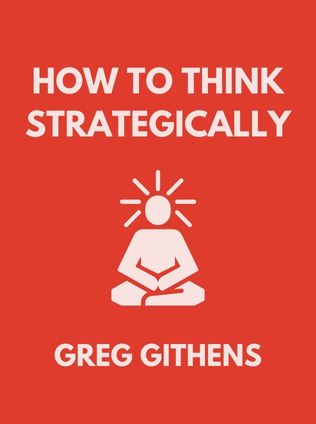
How to Think Strategically
Sharpen Your Mind. Develop Your Competency. Contribute to Success.
By Greg Githens
Published 07/2019
About the Author
Greg Githens is a prominent thought leader in the project management community, renowned for his expertise in innovation and strategic thinking. As an executive coach and advisor, Githens has a deep understanding of industry insights, customer value propositions, and business development. He brings exceptional skills in analyzing growth opportunities and optimizing business models. His extensive experience working with a diverse range of organizations, including fast-growing entrepreneurial companies, family businesses, large corporations, government agencies, and nonprofits, has enriched his perspective on strategic thinking. Githens' commitment to fostering competency and mastery in individuals positions him as a key figure in the realm of strategic leadership.
Main Idea
The central premise of How to Think Strategically by Greg Githens is that strategic thinking is a unique and valuable competency that individuals can develop to enhance their personal and professional lives. The book emphasizes the distinction between strategies and goals, the importance of curiosity, and the role of ambiguity in crafting effective strategies. By exploring twelve microskills of strategic thinking, Githens provides readers with practical tools to sharpen their minds, develop their competencies, and contribute meaningfully to organizational success.
Table of Contents
- Introduction
- The Difference Between Strategies and Goals
- Microskills of Strategic Thinking
- The Fuzzy Front End of Strategy
- Knowledge Soup and the Uncomfortable Unknown
- Strategic Decisions and Insights
- Mastery and Perspective
- Dialogue and Deliberation
- Conclusion
Introduction
In the introduction, Githens sets the stage for his exploration of strategic thinking by highlighting the demand for individuals who can think strategically in today's organizations. He argues that competent strategic thinkers are rare and valuable, capable of navigating and shaping complex environments. Githens draws on his rich experience across various sectors to present a comprehensive guide to developing strategic thinking skills.
The Difference Between Strategies and Goals
Githens elucidates the critical difference between strategies and goals, emphasizing that while goals are the desired outcomes, strategies are the means to achieve them. He uses the analogy of a journey, where the goal is the destination, and the strategy is the route taken. This distinction is essential for understanding how to approach strategic planning and execution effectively.
"Strategy is a relationship among ends, ways, and means. People with competence and cleverness are the ones who connect the dots in the relationship." — Greg Githens
Microskills of Strategic Thinking
The book delves into twelve microskills essential for strategic thinking. These microskills, including curiosity, storytelling, and reflection, are practical tools that individuals can incorporate into their daily routines to enhance their strategic capabilities.
Curiosity
Curiosity is presented as a fundamental microskill that drives strategic thinking. Githens encourages readers to stay in "learning mode" and to continuously question how things work and how they can be improved. Engaging with diverse perspectives and seeking to understand opposing viewpoints are key practices for cultivating curiosity.
- Monitor your thinking to ensure you are in learning mode.
- Engage with people who hold different perspectives.
Storytelling
Storytelling is another vital microskill that helps strategic thinkers communicate complex ideas and inspire others. By crafting narratives that include characters, tensions, actions, and resolutions, individuals can make sense of ambiguity and guide their organizations toward new, desired futures.
Sign up for FREE and get access to 1,400+ books summaries.
You May Also Like
The Subtle Art of Not Giving a F*ck
A Counterintuitive Approach to Living a Good Life
By Mark MansonRich Dad Poor Dad
What the Rich Teach Their Kids About Money - That the Poor and Middle Class Do Not!
By Robert T. KiyosakiHow To Win Friends and Influence People
The All-Time Classic Manual Of People Skills
By Dale CarnegieQuiet: The Power of Introverts
The Power of Introverts in a World That Can't Stop Talking
By Susan Cain



















